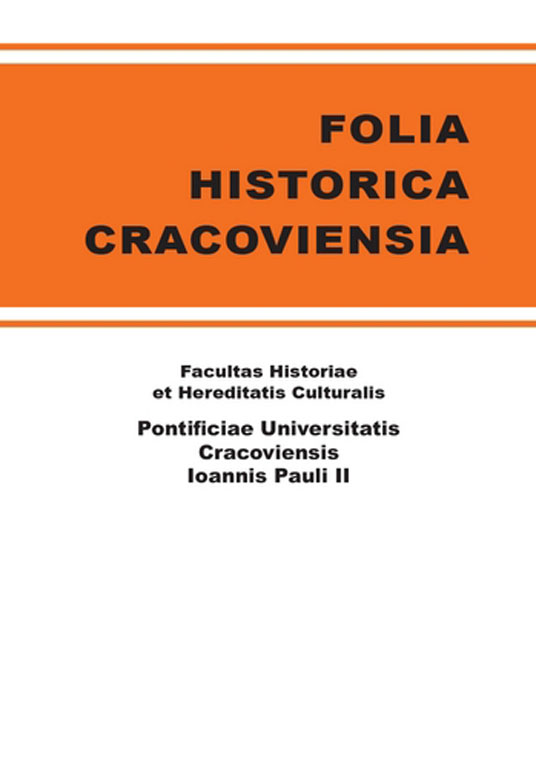„Opłakane czasy” – epidemia dżumy w Krakowie w latach 1707–1710. Przyczynek do badań nad upadkiem królewskiego miasta
DOI:
https://doi.org/10.15633/fhc.222Słowa kluczowe:
„Opłakane czasy”, epidemia dżumy, Kraków, 18 wiekAbstrakt
The beginning of the XVIIIth century has been recorded in history of the city of Cracow as a time of war and famine. “Pitiful times” – such term was used in the chronicle of the Norbertine Sisters Convent. This cataclysms was followed by the last one and the most dangerous of them – an epidemic. The plague was a deathblow to the city on the verge of falling into ruin.
One of the most important goals of the article is pointing the connections between physical, economical or spiritual state of the municipal community and enormous proportions as well as consequences of the plague. Considerations are started from describing the situation in Cracow and nearest vicinity the day before cataclysm. Subsequently Authoress characterized preventive measures, basing on municipal bills and regulations. The main part of the article presents the drama of the ordinary cracovians. To throw light on the depth of demographical, cultural and spiritual crisis in the city, the view of situation is completed by statistics based on ecclesiastical sources – records and acts of the chapters of The Dominican Order. Authoress refers also to the texts publicized in Cracow at the begging of the XVIIIth century – from medical treatises to panegyric written by Marcin Ksawery Szumliński to venerate the authorities of the city fighting against the plague.
Pobrania
Opublikowane
Numer
Dział
Licencja
Prawa autorskie (c) 2012 Emilia Karpacz

Praca jest udostępniana na licencji Creative Commons Attribution-NonCommercial-NoDerivatives 3.0 Unported License.
Twórca oświadcza, że przysługują mu prawa autorskie do utworu i że nie są ograniczone w zakresie objętym niniejszym oświadczeniem oraz że utwór jest dziełem oryginalnym i nie narusza praw autorskich innych osób.
Twórca zezwala Uniwersytetowi Papieskiemu Jana Pawła II w Krakowie na nieodpłatne, niewyłączne i nieograniczone w czasie korzystanie z utworu, to jest:
- utrwalanie i zwielokrotnianie: wytwarzanie egzemplarzy utworu techniką drukarską, reprograficzną, zapisu magnetycznego oraz techniką cyfrową;
- obrotu oryginałem albo egzemplarzami, na których utwór utrwalono (wprowadzanie do obrotu, użyczenie lub najem oryginału albo egzemplarzy, publiczne wystawienie, wyświetlenie, a także publiczne udostępnianie utworu w taki sposób, aby każdy mógł mieć do niego dostęp w miejscu i w czasie przez siebie wybranym);
- włączenie utworu w skład utworu zbiorowego;
- udzielanie przez Uniwersytet Papieski Jana Pawła II w Krakowie sublicencji Creative Commons Uznanie autorstwa 4.0 Międzynarodowe (CC BY 4.0)
Uniwersytet Papieski Jana Pawła II w Krakowie udostępnia utwór na Platformie Czasopism należącej do uczelni, na licencji Creative Commons Uznanie autorstwa 4.0 Międzynarodowe (CC BY 4.0). Tym samym uprawnia wszystkich zainteresowanych do korzystania z utworu pod następującymi warunkami:
- zostanie podany autor i tytuł utworu,
- zostanie podane miejsce publikacji (tytuł czasopisma i identyfikator DOI oryginalnie opublikowanego utworu).

